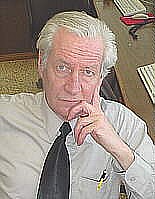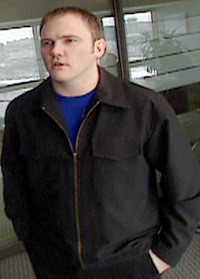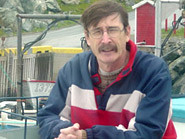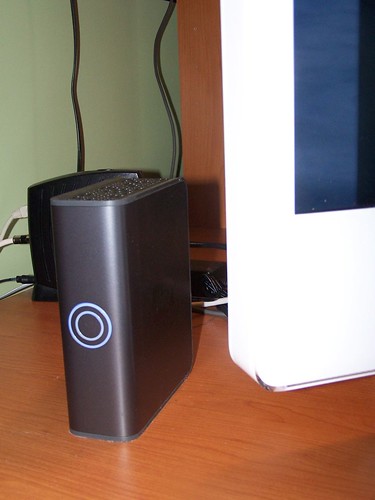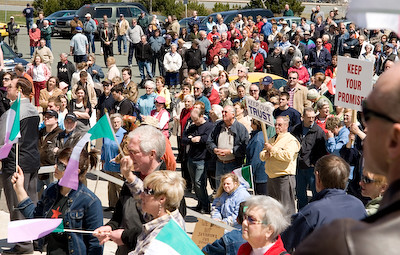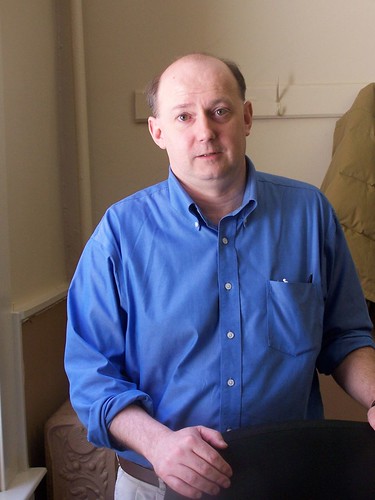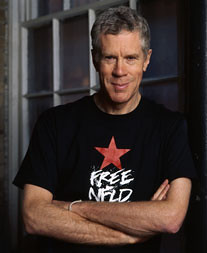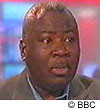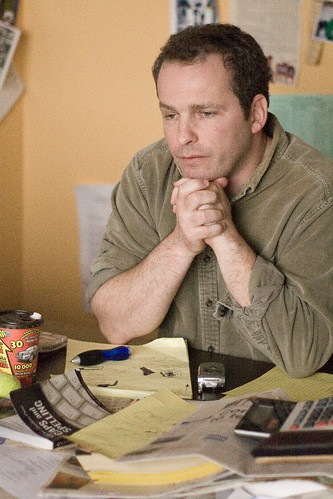
Managing editors wear many hats, god knows. But one of them should not be appearing as a speaker – make that cheerleader – at an emotionally-charged political event.
It is my view that Ryan Cleary (right, photo by Duncan De Young/The Muse) made such a mistake, by speaking at the Stand Up For Newfoundland & Labrador political demonstration Friday at Confederation Building.
I was also disappointed - though less so - that Randy Simms, host of VOCM’s Open Line, was emcee for the event. It is fine for Simms to offer political analysis on ‘Here & Now’, but hosting a political rally is something altogether different. However, Simms does an admirable job of staying unbiased during Open Line, and I’ve even heard him play devil’s advocate against causes he apparently believes in. So I am willing to forgive him this momentary lapse.
Cleary’s case is different. He is not a traffic cop on a call-in show; he decides what does and doesn’t get printed in a newspaper that some see as influential.
The Independent is often compared to the now defunct Sunday Express (where I worked) because the latter was controversial and nicely designed. But that is where the similarities end.
The Sunday Express was a newspaper that broke more than a dozen stories every week, whereas The Independent might break one or two. The Sunday Express was an objective newspaper that carried a brief for no one, whereas The Independent is a propaganda sheet that has become a cheerleader for the Williams government and Newfoundland nationalists.
I am not the only individual to question Ryan Cleary’s judgment on appearing at this event. CBC Radio Noon host John Furlong raised exactly this point with Cleary, in a live interview via cell phone from Friday’s event. Here’s an excerpt:
Furlong: Ryan, what about your role as a journalist? Are you worried that you are compromising your impartiality by taking a stand?
Cleary: You know, you asked me that question earlier this morning John, and the first thought that ran through my head was, ‘I wonder, did you ask that question to David Cochrane when he appeared before the Board of Trade, or Craig Westcott, when he gave a speech a while ago to the offshore oil (industry)?’
Furlong: Well, David Cochrane analyzed the political climate. He didn’t take a stand on a public issue. And he was invited to speak. There’s a big difference.
Cleary: Well, I don’t see that as a big difference. I’m here as a Newfoundlander… But here is what Cleary said in the same interview, just two minutes before that:
I’m here today basically as the Editor In Chief of The Independent, but I am also here I guess primarily as a Newfoundlander and Labradorian first.Thanks for, um, clarifying that.
Like a politician, Cleary dodges Furlong’s questions about impartiality, bridging immediately from the sticky subject of ethics over to the ‘rah rah Newfoundland and Labrador’ line, just as a politician would. In fact, Cleary’s speech overflowed with political rhetoric and bombast. (The full text was published as Cleary’s column in Friday’s Independent, and is posted at
their web site .)
The paper’s nationalist stance is widely known and understood, despite Cleary’s occasional half-hearted denials. Just a few weeks ago, on April 20, Cleary reaffirmed this in his column. He was commenting on a guest column by political science professor Michael Temelini, who advocates “opening a discussion” about separating from Canada.
“(Temelini) says there’s nothing wrong with asking whether there’s a better way. True, but people are afraid; they feel threatened. I say Newfoundlanders and Labradorians must finally face their fears.”
Cleary closes that column by saying that the “the bigger dragon to slay will be the media,” a suggestion perhaps that other media aren’t giving separation the attention it deserves. What the other media aren’t doing is selling out their credibility by pumping their fists in the air at political rallies, or wedging their noses firmly – if figuratively – between the nether cheeks of our premier.
In the above noted column, Cleary wrote that: “I do not stand before you to cheerlead for Premier Danny Williams, although I do walk beside him in his quest to push this place forward.”
Look at the fawning treatment the paper gave Premier Williams last week, by printing verbatim his entire speech to the Economic Club of Toronto, without a shred of analysis or commentary, except to say that the Premier “set the record straight” about Newfoundland and Labrador.
Michael Harris, the Editor-In-Chief of The Sunday Express, was quick to praise Premier Clyde Wells if he supported his stand on a particular issue. But Harris kept this praise confined to editorials, didn’t let it filter into the news pages and would never,
ever have stumped for a premier at a political rally.
Maybe Cleary is planning to run for provincial or federal politics, or perhaps land a job in the Premier’s office. He has every right to do so. And it is not against the law to turn what could have been a decent newspaper into a political manifesto.
However, it does cause problems for the journalists who work under him. The columnists are somewhat insulated from this, since they bring subjectivity to the mix, but the reporters need to be objective – and perceived as objective. How can they claim this when the paper itself is so obviously biased against all things ‘Canada’? When their Editor In Chief is out stumping for the premier?
The Independent has some good reporters on staff (though they could be breaking more stories), and some decent columnists. The back section is fabulous, as is some of the intellectual ferment on the opinion pages (to their credit, the paper does publish letters that question its nationalist stance or criticize the premier). Where it falls down is its blatant nationalist agenda, which was
lampooned nicely by the Muse a while ago when it wrote "NL gets raw deal, See story every page". Even fans of the newspaper will agree that this bias is there – it’s why they read the paper. But do they trust it to deliver objective reporting?
No, The Independent is not impartial.
It is not even ‘independent’.
It is propaganda.
 News flash: Veteran broadcaster, weatherman and all-round performer Karl Wells (photo by Randy Dawe) is retiring from CBC, effective August 1. I will have more on this later. In the meantime, the following internal memo from Janice Stein, Managing Editor for CBC NL, sums up this story quite nicely. I had noticed that Karl was becoming much more animated lately, reading the weather like he was calling the play by play in the Stanley Cup finals. Perhaps he was betraying some of that excitement that one must feel when surveying the new vistas that await in retirement. In this case, Karl plans to pursue his freelance writing career. Karl operates a great web site so if you would like to read more about him, click here. Here's the memo from Janice Stein:
News flash: Veteran broadcaster, weatherman and all-round performer Karl Wells (photo by Randy Dawe) is retiring from CBC, effective August 1. I will have more on this later. In the meantime, the following internal memo from Janice Stein, Managing Editor for CBC NL, sums up this story quite nicely. I had noticed that Karl was becoming much more animated lately, reading the weather like he was calling the play by play in the Stanley Cup finals. Perhaps he was betraying some of that excitement that one must feel when surveying the new vistas that await in retirement. In this case, Karl plans to pursue his freelance writing career. Karl operates a great web site so if you would like to read more about him, click here. Here's the memo from Janice Stein: